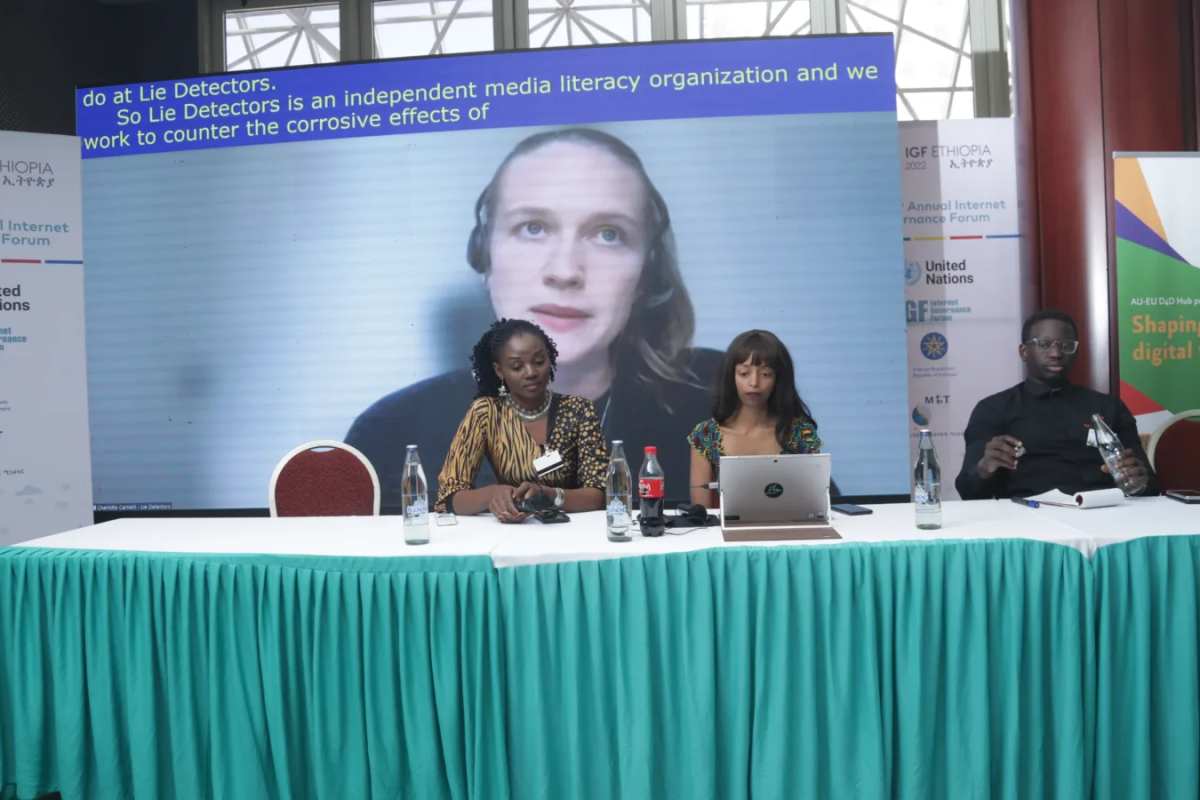News Update |
“There is no silver bullet to tackle online disinformation” was the conclusion of the Town Hall debate Jointly tackling disinformation while protecting human rights, organised by the African Union — European Union (AU-EU) Digital for Development (D4D) Hub at the Internet Governance Forum 2022.
The session, which took place on 2 December 2022 in a hybrid format, brought together over 60 organisations for an open exchange of ideas, experiences, and lessons on how to address disinformation through a multi-stakeholder and human-centric approach. In particular, the debate focused on how Africa-Europe partnerships can help tackle the issue, in light of the AU-EU D4D Hub’s mandate to foster digital cooperation between both continents.
The panellists explained how fact-checking has grown dramatically in recent years, becoming one of the most common measures to tackle disinformation. Nevertheless, more than effective fact-checking is needed, they warned. Africa-Europe cooperation should adopt a comprehensive approach integrating multiple complementary measures, such as building digital literacy for all (including the most vulnerable), holding those who profit from disinformation accountable, and the involvement of all stakeholders in devising solutions.
Bringing all actors to the table
Simone Toussi, Project Officer for Francophone Africa at the Collaboration on International ICT Policy for East and Southern Africa (CIPESA) highlighted how “disinformation is a multi-faceted phenomenon that directly threatens democracy and human rights and affects all stakeholders in society”.
“Disinformation manifests in many ways, and can be perpetrated by a diversity of actors,” she added.
As such, she argued that countering fake narratives needs both online and offline efforts undertaken in a coordinated manner by governments, intergovernmental organisations, civil society, media, academia, and private sector. “Multi-stakeholder collaboration is crucial to bring together different views and understanding of the roles that each actor plays,” she said.
Toussi presented research findings proving that measures to tackle disinformation can be ineffective or inadequate when they only consider the point of view of a single stakeholder. For example, fact-checking is sometimes challenged by lack of access to information. Media and civil society participation can help ensure that governments treat information as a public good.
Engaging with the private sector… how?
The debate also touched on the essential role that technology companies play in keeping disinformation from spreading. Ongoing efforts by private sector include partnering with civil society and fact-checkers — including through multi-stakeholder collaborations as proposed by Toussi.
Nevertheless, for Odanga Madung, journalist and Mozilla Foundation fellow, such measures are not enough. He argued that one of the major contributing factors to disinformation is that fake or misleading information is algorithmically amplified by big companies.
“Big companies and social media platforms profit from the spread of disinformation. It is part of their business model, which is a very serious problem,” he said.
For Madung, tackling disinformation requires strong regulations to protect users and their rights, addressing big technology companies’ dominance, encouraging competition, fostering new ideas on different business models, and decentralising the Internet.
Planting the seeds of change
Charlotte Carnehl, Operations Director at Lie Detectors, proposed further investments in training teachers and fostering exchanges between journalists and school-age kids: “Countering the corrosive effect of disinformation and polarisation on democracy requires empowering school kids and their teachers to tell facts from fake online.”
She argued that enabling journalists to visit schools to explain how professional journalism works is a win-win situation. It can help journalists to learn about how the younger generation accesses and consumes information, while teachers and children can gain practical skills in identifying fake or misleading information online.
“Everybody needs the skills to assess and critically think about information,” Carnehl said. “Kids are actually a high-risk group for disinformation because they are targeted on channels that can’t be monitored, and they are largely navigating them by themselves without their teachers or even their parents present.”
When questioned on the short-term impact of such measures by a member of the audience, Carnehl acknowledged that it’s a long-term investment, “like planting the seeds of a tree”. However, she argued that there are also some immediate positive effects for children.
Finally, Carnehl called for special attention to be paid to marginalised groups, such as rural populations. Civil society organisations could help ensure that everyone can access reliable information, she said.
This article was first published by the Digital for Development Hub on Dec 13, 2022

